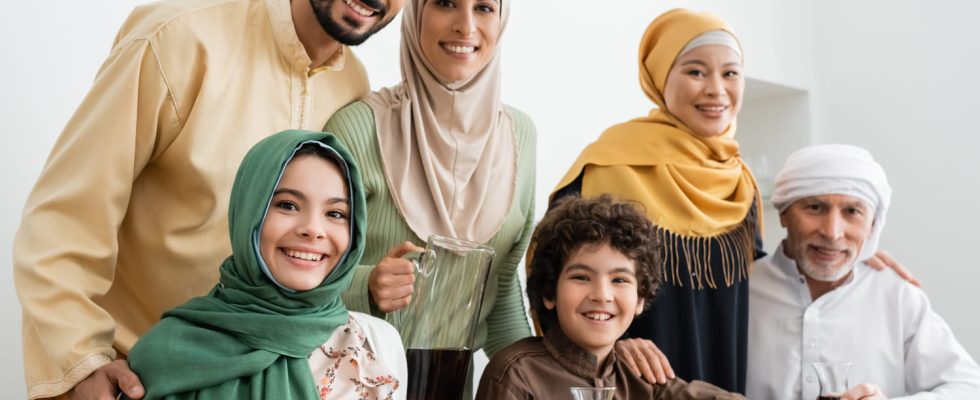Ramadan began this Monday, March 11, 2024. During this holy month, practicing Muslims honor several customs, starting with fasting. Here is the essential thing to know about this symbolic celebration.
The announcement was confirmed by the Grand Mosque of Paris this Sunday March 10 following the Night of Doubt: “the start of the blessed month of Ramadan in France will be Monday March 11, 2024“, the religious body indicated in its press release. This event is one of the five pillars of Islam. During this holy month, Muslims practice fasting from sunrise to sunset. Once night falls, families and loved ones gather for the Ftour, around culinary specialties. Other prohibitions must be respected without fail, until the end of the month of Ramadan, which should take place on Tuesday April 9, 2024. The official date must be revealed during the second Night of Doubt.
What is the origin of Ramadan?
Ramadan is one of the most important Muslim holidays in the religion. To find the origin of Ramadan, we must go back to the year 610. When the angel Gabriel appeared to the prophet Mohammed to reveal the Koran to him. This revelation – Laylat al-Qadr or Night of Destiny – would have occurred during Ramadan. It is to commemorate this event that Muslims practice fasting for a month. Formed by the Arabic root “ar-ramad”, Ramadan means “extreme heat”.
What are the prohibitions during Ramadan?
Throughout the month of Ramadan, the faithful must respect certain prohibitednotably the fasting from food and drink during the day. Practitioners must also abstain from having sex during the day, smoking, using obscene language or wearing makeup, from sunrise to sunset. It is important to note that inadvertent eating does not imply atonement or make-up fasting. Conversely, a deliberate transgression of the rules recommended by Ramadan cancels the fast.
What to eat during Ramadan?
During Ramadan, in the evening, during Ftour or Iftar, it is possible to break the fast, to regain strength before the following day. Dates, Chorba, Harira, semolina, wheat, oriental pastries... THE Ramadan meal is particularly festive and brings the whole family together around traditional dishes.
L’Eid al-Fitrwhich marks the end of Ramadan, is called “Small party“, as opposed to the Great Feast of Eid el-Kébir (or Eid-Al Adha, day of sacrifice). After a prayer at the mosque, Muslims, on the occasion of a hearty lunch, can offer gifts or different foods, traditionally pastries. It is also the time to fulfill the religious obligation of Zakat El Fitr.
What is Zakat El Fitr and how much is it?
According to tradition, practitioners pay a alms for breaking the fast dedicated to the poorwhich we call the Zakat El Fitr. This custom thus makes it possible to validate the month of fasting of Ramadan and to purify it. This alms can be paid throughout the month of Ramadan, but usually the faithful do it before the Eid al-Fitr prayer. Furthermore, it is the Muslim Theological Council of France which sets the amount of alms Zakat El Fitr. This year, its amount should be 9 euros per person, according to the French Council of Muslim Worship (CFCM).
To wish a good Ramadan to loved ones, it is customary to say “Ramadan mubarak” ! We can also say “Ramadan Kareem” at the very beginning of the month of Ramadan, which means “generous Ramadan, beneficial Ramadan”.
Why will there be two Ramadans in 2030?
The dates of Ramadan change every year. They depend on the Muslim calendar, also known as the “Hijri” calendar, and the Gregorian calendar. The Muslim calendar is lunar, the second solar. “From one year to the next, the start of the Muslim year shifts by 10 to 12 days compared to the seasons., details the Paris Observatory website. Which explains why there will be two Ramadans in 2030one will fall in January and the other in December of the same year.
